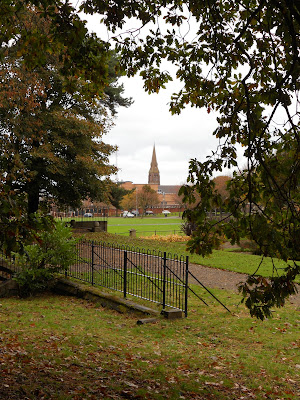 |
| Dundonald Methodist |
Someone has asked that I sketch out a typical day here in Belfast. However, that is easier said than done, mostly because I really don’t have a typical day yet. This coming week will be the first week that all church/community programs are in full swing, so I have yet to figure out exactly what my schedule is like. But there are a couple days that I do have a good sense of—Sunday being one of them. So, per request, I’m going to break open the ship’s log and tell you about my Sundays.
And if you find yourself bored, just blame the “someone” who asked me to do this in the first place. She may or may not be related to me. And you might possibly find her in the EBC library on a Sunday morning. Also, please remember that E! True Hollywood Story has not been beating down my door for the filming rights.
Yet.
08.00 Go for a run with my housemate Joan. Joan runs marathons. I do not. Thus, we’ve compromised by deciding to run at a “conversational pace.” But let’s not kid ourselves—she makes more conversation than I do.
09.00 Start getting ready for church. Remember, when turning on the water, to make sure that the shower head is not aimed at the shower wall. Otherwise, water will pour through the floor and course down the kitchen walls and counters—not unlike a small waterfall.
09.02 Remind self to call plumber about aforementioned waterfall.
10.15 Leave house to walk to bus stop.
10.16 Stop at front door, run back upstairs, and close skylight window so that the pigeons will not be tempted to fly inside my bedroom. Also, it looks like rain.
10.18 Leave house to walk to bus stop.
10.20 Wish that I had left the house that second time with umbrella in hand. It is raining.
10.26 Arrive at bus stop, greeted by sudden sunlight, blue sky, and a woman with twins in her pram.
10.40 Find seat on the bus. Not difficult, considering that the only passengers are me, the mother with twins, and an angsty teenager. Or maybe it is difficult. So many open seats—an agony of indecision.
10.58 Arrive at Dundonald Methodist two minutes early for 11:00 service. Ecstatic. Feel like I’ve just won a Pulitzer.
11.15 Sunday school begins. I have the older kids in my class—P5-P7 (ages 8-10); there are about 5 of them, and so far our conversations have revolved around Tigons (an animal that is half-lion and half-tiger) and rugby. Believe it or not, my knowledge of both subjects is limited. But I’m learning…
11.40 Realize yet again the limits of American English/pronounciation when in Northern Ireland. True story: one Sunday, I asked the kids what the longest Psalm is—forgetting that Psalm here is pronounced Sam. One of the boys raised his hand and said, quite confidently, “Stairway to Heaven.”
12.00 Church service ends. Everyone here has seriously been so generous—not a Sunday has gone by that I haven’t been invited to someone’s house for lunch.
12.15 Arrive at family’s house for lunch. First things first: coffee and tea are served, along with the ever-present biscuits (cookies).
13.00 Lunch is served. Sunday lunch, you must understand, is a big deal in Northern Ireland (both literally and figuratively). There’s always a good piece of meat to anchor the meal—I’ve been treated to hamburgers, chicken, steak, salmon, and pork. Then there are the vegetables—usually two or three types on the plate: carrots, corn, peas, etc. I have, of course, put the potatoes in a category all their own (I’ve been told that a single meal can feature up to four varieties of potatoes). Seriously, I had no idea that potatoes can be prepared in so many different ways: baked, boiled, fried, mashed, or a combination of methods For instance, one week I was served potato croquettes, which look like oversized tater-tots but—wait for it—are filled with mashed potatoes. Plot twist. I had seconds that day.
13.30 Dessert is served (and I’m not talking about simply breaking out the biscuit-tin again). I’ve had plum cake, apple crumble, rhubarb cobbler, and “proper cheesecake” (the sort you don’t bake…my friends tell me the Cheesecake Factory has it all wrong, and after tasting a chocolate malt cheesecake, I’m prepared to believe them). All desserts are topped with ice cream and heavy cream (or warm custard). Oh, and I’ve also had Pooh Bear ice cream, a local favorite—it has crunchy honey clusters.
14.00 Tea and coffee are served. Complete with biscuits. And chocolate. Seriously, the people in this country have mastered the art of hot drinks, desserts, and carbs in general. A girl could lose her figure having her priorities this straight.
14.20-17.30 Relax. What we do is varied—sometimes a walk, sometimes a little TV, always good conversation.
17.45 Tea is served—and by tea, I mean dinner. Usually sandwiches (ham and cheese, cheese and tomato, butter and cheese, butter and banana), tea and/or coffee, and (you guessed it) biscuits.
18.45 Youth Fellowship starts at church. We’ve got a great group of students—I’m having fun getting to know them. Our time is, of course, concluded with tea, coffee, juice, and the inevitable biscuits.
20.00-22.30ish Relaxing and spending time with some new friends from church. American football, Mickey Mouse coasters, and chocolate may or may not be involved.
I know, I know—this was a riveting post, and now I’ve left you on the edge of your seat. Don’t worry, I’m working on a sequel, cleverly entitled Mondays.
In all seriousness, though—every day of the week, I’m absolutely humbled by the amount of care and love people show for me here. And on Sundays, I’m reminded of it even more. Without a thought, I’m freely offered lifts wherever I need to go, a warm home, food, and friendship. I really can’t express how thankful I am.
 |
| View from church, overlooking the Ballybeen Estate |


















































